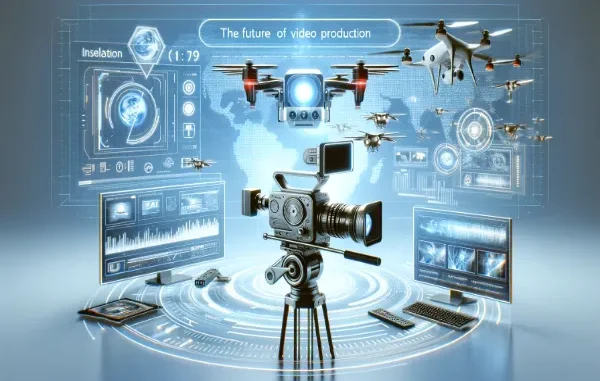
The rise of Artificial Intelligence (AI) has led to groundbreaking developments across various industries, and the world of video production is no exception. Traditionally, filmmaking involved teams of highly skilled professionals working with expensive equipment and complex editing software. However, with AI-powered video tools, much of this labor-intensive process is now being automated, democratizing video production in ways never seen before. AI in filmmaking is poised to transform how videos are created, edited, and consumed, but it also brings along challenges and ethical considerations that must be addressed.
In this article, we explore the future of AI-driven filmmaking, what it means for creators, and the potential implications of this technological evolution.
The Basics of AI in Video Production
AI video production tools use sophisticated algorithms to analyze, generate, and edit video content. These systems are capable of tasks such as scripting, scene generation, visual effects (VFX), voice synthesis, and even editing raw footage into polished videos. One of the most remarkable aspects of AI video generation is its ability to speed up the entire production process. What once took days or weeks of manual work can now be completed in a fraction of the time with AI assistance.
At the heart of AI video generator technology are deep learning models, such as neural networks, that learn from vast datasets to produce high-quality results. For example, AI can study hours of footage to recognize patterns, styles, and techniques, and then apply these learned principles to create or enhance new videos. Some AI platforms even allow creators to input text descriptions, which are then translated into video content—a major leap toward making video creation as easy as writing a script.
Opportunities for Creators: A New Era of Creativity
One of the most exciting opportunities AI brings to video production is accessibility. With the democratization of tools that were previously reserved for high-budget productions, independent creators, small businesses, and even hobbyists now have the ability to produce professional-grade video content without needing extensive technical skills or large financial resources.
- Speed and Efficiency: AI can automate repetitive tasks like video editing, color correction, and sound mixing, dramatically reducing production time. For instance, an AI-driven editing tool can analyze footage and automatically assemble the best shots based on composition, lighting, and action, allowing creators to focus more on the creative aspects of filmmaking.
- Cost-Effective Content Creation: Text to Video AI production is often an expensive endeavor, especially for those just starting out. AI tools eliminate the need for large crews, expensive equipment, and long hours in the editing suite. With affordable AI platforms, creators can produce high-quality videos with minimal upfront investment, making video content creation more accessible to a wider audience.
- Customization and Personalization: AI-powered video generators can produce tailored content that resonates with specific audiences. For example, platforms that use AI to analyze viewer behavior and preferences can help creators design videos that are more engaging and relevant to their target demographic. This is a powerful tool for marketers and businesses looking to optimize their content for greater reach and impact.
Challenges and Ethical Considerations
Despite the many advantages, AI-driven video production is not without its challenges. As with any technological advancement, the rise of AI in filmmaking raises important ethical, legal, and social questions.
- Deepfakes and Misinformation: One of the most controversial uses of AI in video production is the creation of deepfakes—videos that manipulate or entirely fabricate visual and audio content. While deepfake technology can be used for entertainment or satire, it has also been used maliciously to spread misinformation, impersonate individuals, and create misleading narratives. As Image to video AI generation becomes more sophisticated, regulating and monitoring such content will be critical to prevent harmful misuse.
- Job Displacement: As AI tools take over various aspects of video production, there are concerns about the displacement of human jobs. While AI can speed up processes and reduce the need for certain tasks, it cannot fully replace the creativity and vision that human filmmakers bring to the table. The future of AI in filmmaking will likely require a collaboration between humans and machines, but the balance of labor needs to be carefully managed to avoid a loss of employment opportunities in the industry.
- Creative Integrity and Authenticity: There is also the question of authenticity in AI-generated video content. As AI learns from vast amounts of existing media, it raises the issue of originality and ownership. When AI replicates the styles or techniques of famous filmmakers or artists, it may raise questions about who owns the creative work—the human who trained the AI, the creators who provided the data, or the AI itself?
Looking Ahead: The Future of AI in Filmmaking
The future of AI in video production looks incredibly promising, but it will require careful navigation of its challenges. As the technology continues to improve, we can expect AI tools to become even more intuitive and capable, pushing the boundaries of creativity and transforming the industry in ways we can only begin to imagine.
The key to embracing AI in filmmaking lies in understanding its potential while also acknowledging its limitations. Human creativity and intuition will remain at the core of storytelling, while AI tools will serve as powerful assistants, making the production process faster, more efficient, and more inclusive.
As AI meets video, we are witnessing the beginning of a new era in filmmaking—one that is more dynamic, creative, and accessible than ever before. Whether you’re a seasoned filmmaker or a budding creator, the future of video production is undoubtedly exciting.
Leave a Reply